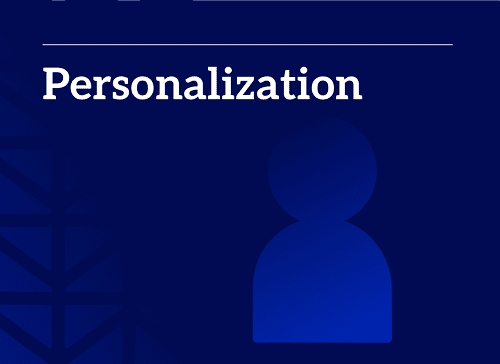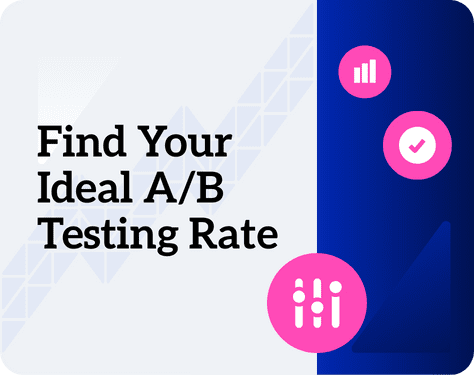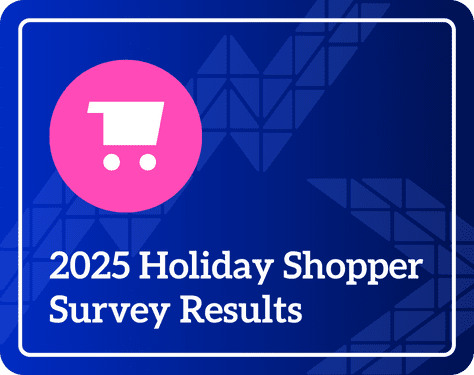“Hi, <name>!” In all likelihood, your first encounter with personalization was in a marketing email, and it did nothing to create a feeling of connection with the company that sent it.
Thankfully, times have changed. AI can now process and analyze shoppers’ clicks as they browse, enabling personalization in real time that adapts to their priorities and preferences. This modern iteration of personalization is elegant and effective, and can supercharge your brand’s ability to engage and retain customers. No longer a nice-to-have, personalization is a must for growth.
Benefits of Website Personalization
Personalization may seem like a daunting prospect. After all, when you create dynamic shopping experiences that adapt to individual preferences, you surrender a degree of control over your online storefront when compared with static pages and inflexible business rules. By incorporating shoppers’ needs and guiding them to relevant products and offers, you can shape an experience that not only satisfies their expectations, but can boost the bottom line. Benefits accrue throughout the customer lifecycle:
1. The Consumer Expects It
Online shoppers need help, and they know it. With millions of products available across the web, consumers recognize the value of curation, and they rely on brands to provide assortments that match their preferences and interests. In fact, 71% of customers expect personalization from companies, McKinsey found.
Brands are responding to this demand with personalized experiences that help uncover items that match shoppers’ intent, and eliminate the “noise” of irrelevant choices. Personalization is now pervasive, with 93% of retailers investing more than ever and 57% saying they have full personalization capabilities, according to Salesforce.
Given the high percentage of brands claiming personalization competence, it’s no longer a “nice to have;” it’s business-critical. In fact, 76% of consumers report being frustrated when shopping experiences aren’t personalized, McKinsey found.
2. Brands Get Better Customer Insights
Shoppers are willing to help retailers personalize by sharing information – and that means you can glean valuable insights about their behavior that can improve your business over time.
Consumers recognize that brands need data in order for them to receive relevant picks and content in return. Nearly six in 10 shoppers believe sharing is necessary for personalization, according to Internet Retailer.
As shoppers consider products on your site, you can use signals such as their browsing choices, on-site search terms, time spent on particular pages, and questions they ask via live chat to inform the experience in real time. This continuous refinement helps hone in on relevant items faster, and also pays dividends during future interactions, when shoppers can “pick up where they left off” with site experiences tailored to the preferences they expressed previously.
In addition, you can analyze aggregate data to detect larger patterns and inform strategic priorities. For example, if personalization elevates a particular product line and shoppers respond with consistently higher order sizes, you might consider finding ways to extend that line, or develop similar items.
3. Personalization Amplifies Engagement Rates
When shoppers encounter products and content that align with their preferences, they’re likely to continue browsing your eCommerce site, resulting in a higher engagement rate. Buying guides, video features, and other relevant content can spur email signups and social media follows that keep the connection going and spur future visits. This repeat engagement is important because with each personalized encounter, Monetate found that the likelihood of purchase grows: conversion rates increase by as much as 1,800% between the first personalized shopping experience and the 10th.
Not only do consumers engage more deeply with brands that personalize, but they’re also willing to spread the word. McKinsey found that customers are 78% more likely to recommend brands that offer a personalized experience.
Consider the shopper who enters a culinary retailer’s site and keyword searches the name of a premium brand, then uses navigation to browse cookware. Based on the clue afforded by the initial search, personalization dynamically prioritizes high-end options and gourmet class offerings at nearby store locations. The shopper adds a top-of-the-line set to their wishlist before registering for a class. The class registration confirmation includes links to more expert cookery content, leading the shopper to share a video on social media. When they receive a discount free shipping offer, they buy the set and join the loyalty club. Because the brand proved its relevance from the first visit, the shopper stayed on the site and kept returning, ultimately leading to a big-ticket purchase.
4. Tailored Experiences Improve Conversion Rates
Personalization tactics improve conversion rate metrics by offering customers more engaging and relevant experiences at key touchpoints. A survey from Netcore and Wakefield Research found that retailers implementing personalization improved conversion rates by an average of 45%.
Furniture retailer Room & Board saw even better results after implementing Monetate’s automated personalization on the home page and throughout the eCommerce path to purchase. Room & Board deployed individual fit experiences, leveraging shopper profiles to deliver unique experiences that draw on the company’s extensive library of eCommerce content. Majority fit experiences that test and automatically hone personalized offerings across user segments add another dimension of relevance. With more than 100 personalized experiences now operational sitewide, Room & Board realized a conversion lift of 80%.
Gains in conversion help boost overall revenue, with the majority of retailers implementing end-to-end personalization realizing a return on investment of at least 300%, according to Monetate research.
5. Personalization Cultivates Brand Loyalty
When customers return to a website and encounter curated selections that reference their past purchases, they not only save time finding what they need next, but they value being recognized. Forrester Research found that consumers most appreciate personalized experiences in the post-purchase phase.
Luckily, the process of buying online yields a trove of valuable data you can use to tailor subsequent interactions with the brand. The total order size indicates whether the customer is a bargain shopper or willing to splurge; with the shipping address in hand, you can assign them to a region for geography-specific offers; and the specific items sold can trigger suggestions for accessories.
Infusing post-purchase re-engagement strategies and loyalty club communications with personalized products and content is a winning strategy for building brand loyalty. In fact, loyalty and retention growth is the top impact of personalization for retail businesses, according to a Retail Touchpoints survey.
How Can a Personalization Solution Elevate My Business?
Personalization is an eCommerce game-changer, with advantages for customers and businesses alike. Aligning marketing tactics and merchandising with customer needs and expectations results in greater customer insights, deeper engagement, improved retention and more – all of which add up to more sales and a healthier bottom line.
Monetate’s Automated Personalization Engine can help you leverage customer knowledge with customized personalization across the customer journey by:
- Creating 1-to-1 personalization for each visitor to your site
- Providing a toolset to establish, monitor, and exceed a variety of performance benchmarks
- Removing the overwhelm of scaling personalization across your eCommerce platform with automation and a marketer-friendly interface
- Delivering powerful analytics and reporting, synthesized into business and customer insights
With Monetate’s AI-powered personalization, you can deliver highly relevant, context-aware experiences at scale – helping satisfy shoppers’ expectations from the first click onwards and building a strong brand connection.



